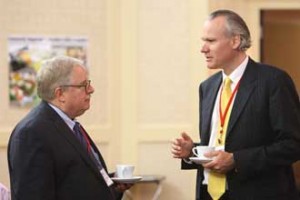
By Jim Hynes
They came from far and near, from developed and developing countries, with local as well as international points of view. Over 350 leaders in research, government, aid agencies, international bodies and industry convened at the Second McGill Food Conference on Global Food Security this week to look back at the causes of and forward to the solutions to the growing crisis that has left approximately 1 billion people in the world undernourished.
The theme of this year’s conference was the impact of the global financial crisis on food security. Last year, the inaugural food conference ended with a resounding call for renewed investment in agriculture, which had steadily declined in both developed and developing countries over the past 30 or so years. In response, the 2009 event, which wrapped up yesterday, featured sessions on the investments needed for agricultural development and on access to finance and agricultural credit. The conference got under way Monday with a general session on food security in a challenging economic environment and concluded with sessions on research and capacity building and the response of international agencies to the ongoing challenges of food security. Forty-five speakers from 18 countries addressed the conference.
“Putting a conference of this size together is a big undertaking,” said Chandra Madramootoo, Dean of McGill’s Faculty of Agricultural and Environmental Sciences and the driving force behind the conference. “But I think it has been well worth the effort once again this year. The fate of about 1 billion people may depend on how some of the challenges and initiatives we’ve focused on this past week are dealt with and put into action, especially some of those dealing with financial investment,” he said.
The conference program also included a public lecture Monday evening discussing Global Food Security: Effects of the Global Recession and Future Prospects. The lecture was moderated by René Provost, Director of the Centre for Human Rights and Legal Pluralism at McGill’s Faculty of Law. Approximately 250 people were on hand to hear speakers Michel Barnier, Member of the European Parliament and a former French Minister of Agriculture, Michael Chong, MP for Wellington-Halton Hills, Hafez Ghanem, Assistant Director-General, Food and Agriculture Organization of the United Nations (FAO), H.E. Professor Iyorwuese Hagher, Nigerian High Commissioner to Canada, and David Malone President, International Development Research Centre (IDRC).
The importance of both private and public sector investment and making agriculture profitable again in both developing and developed countries were among the themes touched upon by several of the speakers.
“Over the past couple of decades farming in Canada has become wholly unprofitable,” said Chong, who drew parallels between the Canadian situation and some developing countries, singling out years of neglect, misdirected funding, restrictions and other policies as some of the causes of what he called the “hollowing out of our productive capacity.”
Barnier, who blamed “30 years of disinterest, 30 years of cutbacks, 30 years of dismantling,” for the current state of global agriculture, quoted a 2008 World Bank report saying that “one dollar invested in agriculture was the most efficient dollar spent in the fight against poverty.”
For more on the Second McGill Food Conference on Global Food Security, visit www.mcgill.ca/globalfoodsecurity. Conference organizers will be posting podcasts of the main conference events in the coming weeks.
